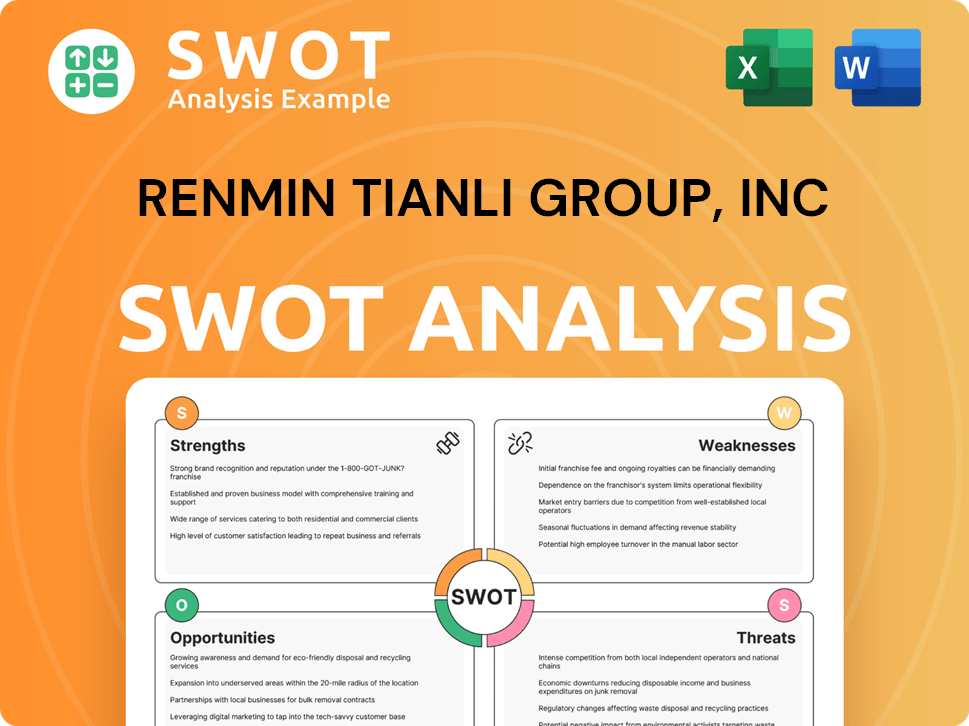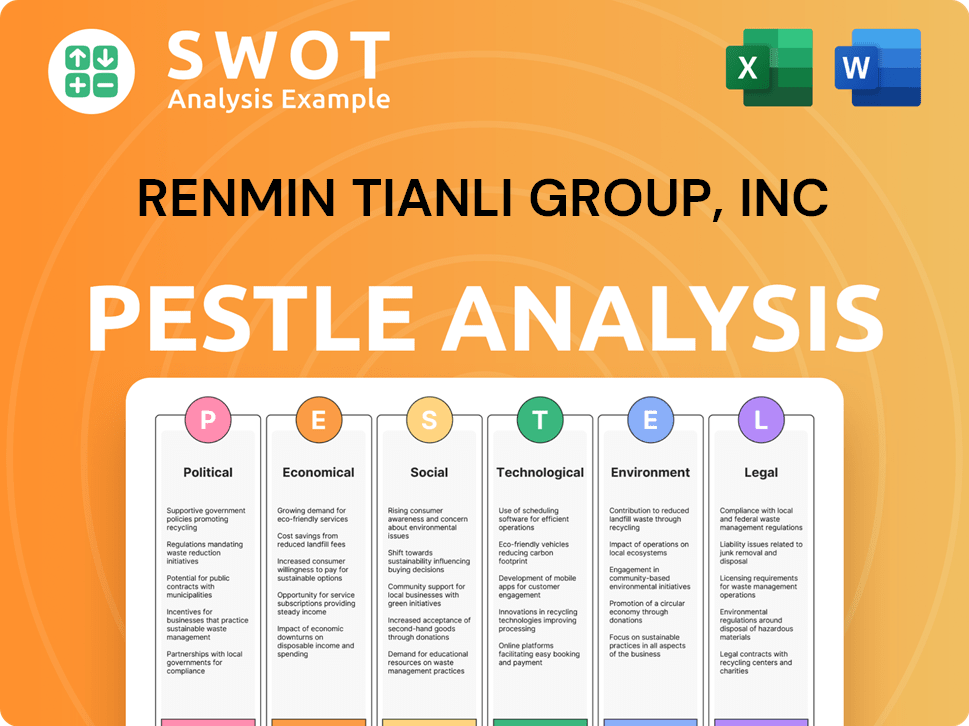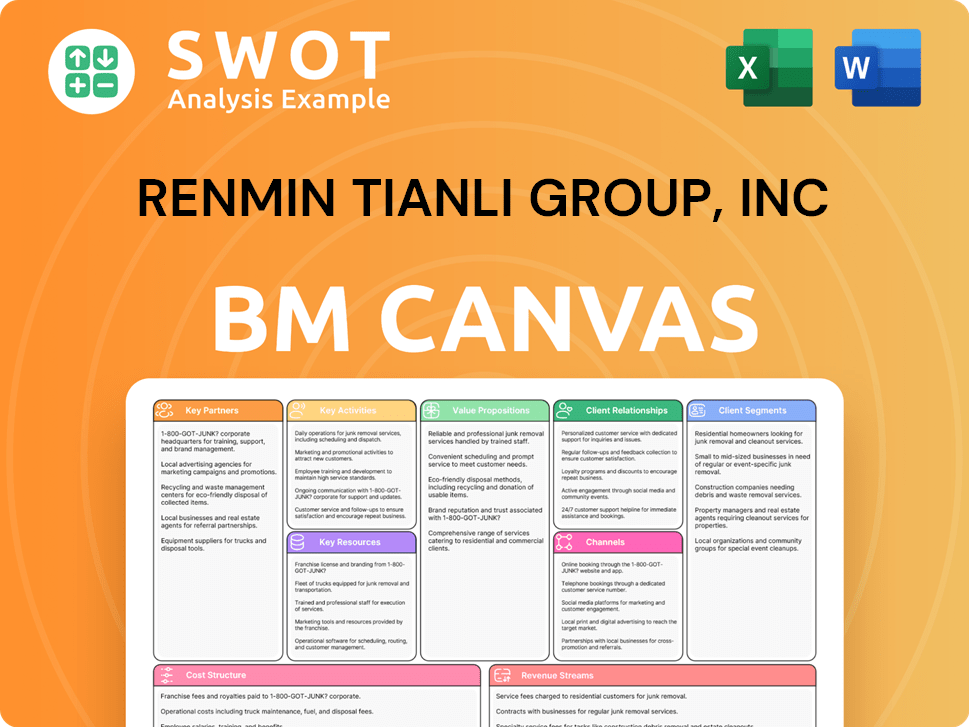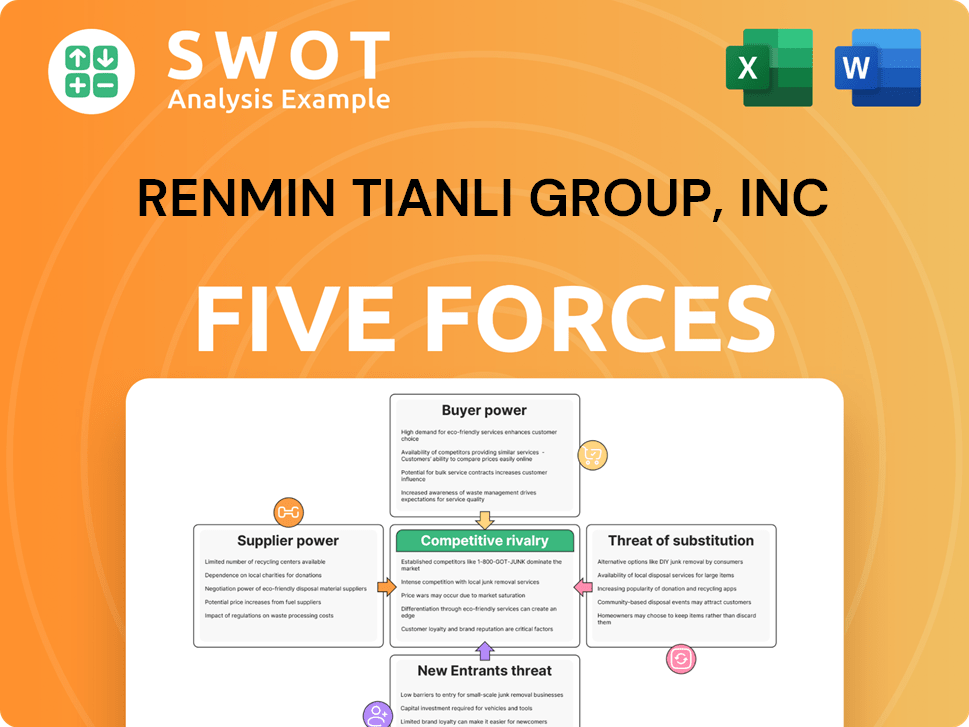Renmin Tianli Group, Inc Bundle
What Went Wrong with Renmin Tianli Group's Sales & Marketing?
Renmin Tianli Group, Inc., a Chinese agricultural firm, initially focused on hog breeding and agricultural products, targeting the burgeoning Chinese market. Its journey, however, took a dramatic turn, evolving from a hog farming business to a diversified company. This shift, along with its eventual delisting, provides a fascinating case study in business strategy and market adaptation.

Exploring Renmin Tianli Group's Renmin Tianli Group, Inc SWOT Analysis is crucial for understanding its sales strategy, marketing strategy, and overall business strategy within the competitive Chinese market. Analyzing its approach to product distribution, brand positioning, and customer engagement offers valuable lessons for businesses navigating similar challenges. This analysis provides insights into the company's sales performance, marketing campaign examples, and how it attempted to generate revenue in a rapidly changing environment.
How Does Renmin Tianli Group, Inc Reach Its Customers?
The sales strategy of Renmin Tianli Group centered on a dual approach, utilizing both direct and indirect channels to reach its customer base. This strategy was crucial for the company's business strategy, allowing it to cater to different market segments effectively. The evolution of its sales channels showcases the company's adaptability and its understanding of the market dynamics.
Initially, the primary sales channel for breeder and market hogs involved direct sales, where purchasers would visit the farms. This method minimized transportation costs and risks, with payments typically made at the point of sale. This approach was particularly effective for the company's core product, the breeder and market hogs. Furthermore, the company's marketing strategy included the development of its own trademark, 'Xiduhei,' for its fresh black hog meat products, enhancing brand recognition and customer loyalty.
The company expanded its sales channels to include retail distribution for its specialty processed black hog pork products. This expansion marked a significant shift in its marketing strategy, targeting a broader consumer base. The company's sales and marketing force consisted of approximately 37 employees in Wuhan City as of December 31, 2017, supplemented by independent distributors, sales representatives, and agents.
The primary sales channel for breeder and market hogs involved direct sales. Purchasers would visit the farms directly, reducing transportation costs and risks. Payments were made at the time of sale, streamlining the transaction process.
The company introduced retail distribution for its specialty processed black hog pork products. This included sales through supermarkets, hotels, restaurants, and other retailers. The expansion into retail distribution broadened the customer base and increased market reach.
Renmin Tianli Group initiated sales of specialty processed black hog meat through the internet. This early adoption of e-commerce for its retail products demonstrated a forward-thinking approach. The online sales channel provided an additional avenue for reaching consumers.
As of December 31, 2017, the company's sales and marketing force consisted of approximately 37 employees in Wuhan City. This team was supported by independent distributors, sales representatives, and agents. This structure helped expand market reach and manage distribution effectively.
The company's sales strategy involved a mix of direct and indirect channels. Direct sales of hogs minimized costs, while retail distribution expanded market reach. The early adoption of e-commerce and a dedicated sales force further enhanced the company's marketing efforts.
- Direct sales to reduce costs and risks.
- Retail distribution to reach a broader customer base.
- E-commerce to capitalize on online sales.
- A dedicated sales and marketing force to manage distribution.
For a deeper dive into the overall approach, consider exploring the Growth Strategy of Renmin Tianli Group, Inc, which provides a comprehensive view of the company's strategic initiatives.
Renmin Tianli Group, Inc SWOT Analysis
- Complete SWOT Breakdown
- Fully Customizable
- Editable in Excel & Word
- Professional Formatting
- Investor-Ready Format

What Marketing Tactics Does Renmin Tianli Group, Inc Use?
The marketing tactics employed by Renmin Tianli Group, Inc. have evolved with its business scope. Initially, the company's marketing efforts were minimal, reflecting a direct-to-consumer sales model where customers visited their farms to purchase hogs. This approach kept marketing expenditures low.
However, the expansion into processed black hog products necessitated a shift in strategy. The company established a dedicated marketing team and increased its spending to support distribution efforts. This move indicates a strategic adaptation to reach a broader consumer base and promote its processed goods.
While specific details about digital marketing strategies are limited in the provided information, the company's venture into online sales for black hog products by July 2014 suggests an early adoption of digital channels. The broader context of the Chinese agricultural industry in 2024-2025 reveals a significant trend toward data-driven marketing and technological integration. The industry's evolution highlights the increasing importance of digital tactics, even though the company's operations largely predate the full bloom of these trends.
Renmin Tianli Group's initial marketing strategy focused on direct sales from its farms. This approach minimized marketing costs, reflecting a lean operational model. The primary focus was on direct customer interaction.
The introduction of processed black hog products prompted a shift in marketing strategy. This included the formation of a dedicated marketing team. Increased marketing expenditures were allocated to support product distribution.
The company's move into internet sales by July 2014 suggests engagement with digital channels. This early adoption indicates an awareness of the growing importance of online platforms. Digital marketing strategies likely played a role in reaching a wider audience.
The Chinese agricultural industry in 2024-2025 is experiencing significant advancements in smart farming and digital monitoring. This trend underscores the growing importance of data-driven marketing. Technological adoption is becoming increasingly crucial in the sector.
The use of traditional media like TV, radio, and print is not detailed. However, the focus on physical retail and direct sales suggests a localized approach. This approach may have been more traditional in the initial phases of the company.
As of 2024, the agricultural sector in China is seeing increased investment in digital marketing. This includes AI-powered solutions and data analytics. Renmin Tianli Group may need to adapt its marketing strategies to remain competitive.
Understanding the evolution of Renmin Tianli Group's marketing tactics provides insights into its business strategy. The shift from direct sales to a more diversified approach reflects its growth. The company’s Revenue Streams & Business Model of Renmin Tianli Group, Inc provides additional context.
- Sales strategy: Adaptability to market changes and product diversification.
- Marketing strategy: Transition from low-cost, direct sales to a more comprehensive approach.
- Business strategy: Focus on both traditional and digital marketing channels.
- Market analysis: Leveraging industry trends in digital marketing and smart farming.
- Company profile: Understanding the evolution of marketing tactics alongside the company's growth.
Renmin Tianli Group, Inc PESTLE Analysis
- Covers All 6 PESTLE Categories
- No Research Needed – Save Hours of Work
- Built by Experts, Trusted by Consultants
- Instant Download, Ready to Use
- 100% Editable, Fully Customizable

How Is Renmin Tianli Group, Inc Positioned in the Market?
The brand positioning of Renmin Tianli Group, Inc. centered on its identity as an agricultural enterprise in China, specifically focusing on hog breeding and the production of specialty pork products. Their core message emphasized the provision of high-quality pork, particularly from traditional Chinese Enshi Black Hogs. This strategic focus aimed to carve out a distinct niche within the competitive agricultural market.
The company's approach involved differentiating itself through research in genetics, breeding, and nutrition to enhance its production capabilities and the quality of its hogs. This commitment to improvement was central to its brand promise. The emphasis on premium Enshi Black Hog meat was designed to attract customers willing to pay higher prices, thereby improving margins.
The brand's appeal was rooted in the promise of superior quality, particularly for its premium Enshi Black Hog meat, which allowed for higher prices and margins. While specific brand perception data or awards for Renmin Tianli Group are not available in the provided context, the company's efforts to establish a distinct identity in the market, especially with its 'Xiduhei' trademark for processed products, highlighted the importance of brand consistency.
Renmin Tianli Group's brand positioning heavily emphasized the quality of its pork products, particularly the premium Enshi Black Hog meat. This focus aimed to attract customers willing to pay a premium for superior quality.
The company differentiated itself through research and development in genetics, breeding, and nutrition. This approach aimed to consistently improve its production capabilities and the quality of its hogs, a key aspect of its business strategy.
The target audience for Renmin Tianli Group likely consisted of consumers seeking high-quality, premium pork products. The emphasis on Enshi Black Hog meat suggests a focus on a segment willing to pay a premium for superior taste and quality.
Brand consistency was maintained through the 'Xiduhei' trademark for processed products. This consistency was important for building brand recognition and trust among consumers, which is a key element of their marketing strategy.
The broader agricultural sector in China is increasingly focused on high-quality and green products. Government initiatives supporting sustainable farming practices and technological advancements influence brand positioning for agricultural companies. The market analysis indicates a growing demand for premium products.
- The Chinese pork market is one of the largest globally, with significant consumer demand.
- Consumers are increasingly prioritizing food safety and quality.
- Government policies support sustainable and high-quality agricultural practices.
- Technological advancements in breeding and production are becoming more prevalent.
Renmin Tianli Group, Inc Business Model Canvas
- Complete 9-Block Business Model Canvas
- Effortlessly Communicate Your Business Strategy
- Investor-Ready BMC Format
- 100% Editable and Customizable
- Clear and Structured Layout

What Are Renmin Tianli Group, Inc’s Most Notable Campaigns?
The sales and marketing strategies of Renmin Tianli Group, Inc, didn't feature specific, large-scale campaigns in the provided information. However, key initiatives acted as marketing and sales efforts. These initiatives included the expansion of retail channels for specialty pork products and a broader strategic plan focusing on diversification.
The company focused on expanding its retail presence, particularly for its 'Xiduhei' brand, aiming to reach a wider customer base and capitalize on the premium market for Enshi Black Hog meat. This expansion involved using supermarkets, hotels, restaurants, and later, the internet. The termination of an exclusive marketing agreement in 2012 supported this retail growth by allowing for wider distribution.
Another significant "campaign" was the "New Strategic Plan" announced in July 2014. This plan aimed to transform the company beyond hog farming through investments and acquisitions in high-growth industries. While not a direct marketing campaign for agricultural products, this corporate strategy was intended to enhance shareholder value and drive future profitability. This strategic shift influenced the company's business model and long-term direction.
The retail expansion aimed to diversify revenue streams beyond direct hog sales. The focus was on specialty processed black hog pork products under the 'Xiduhei' trademark. Key channels included supermarkets, hotels, restaurants, and the internet.
The "New Strategic Plan" announced in July 2014 aimed for diversification. The goal was to transform the company into a diversified entity through investments and acquisitions. This strategic shift impacted the company's business model and long-term direction.
Renmin Tianli Group, Inc Porter's Five Forces Analysis
- Covers All 5 Competitive Forces in Detail
- Structured for Consultants, Students, and Founders
- 100% Editable in Microsoft Word & Excel
- Instant Digital Download – Use Immediately
- Compatible with Mac & PC – Fully Unlocked

Related Blogs
- What are Mission Vision & Core Values of Renmin Tianli Group, Inc Company?
- What is Competitive Landscape of Renmin Tianli Group, Inc Company?
- What is Growth Strategy and Future Prospects of Renmin Tianli Group, Inc Company?
- How Does Renmin Tianli Group, Inc Company Work?
- What is Brief History of Renmin Tianli Group, Inc Company?
- Who Owns Renmin Tianli Group, Inc Company?
- What is Customer Demographics and Target Market of Renmin Tianli Group, Inc Company?
Disclaimer
All information, articles, and product details provided on this website are for general informational and educational purposes only. We do not claim any ownership over, nor do we intend to infringe upon, any trademarks, copyrights, logos, brand names, or other intellectual property mentioned or depicted on this site. Such intellectual property remains the property of its respective owners, and any references here are made solely for identification or informational purposes, without implying any affiliation, endorsement, or partnership.
We make no representations or warranties, express or implied, regarding the accuracy, completeness, or suitability of any content or products presented. Nothing on this website should be construed as legal, tax, investment, financial, medical, or other professional advice. In addition, no part of this site—including articles or product references—constitutes a solicitation, recommendation, endorsement, advertisement, or offer to buy or sell any securities, franchises, or other financial instruments, particularly in jurisdictions where such activity would be unlawful.
All content is of a general nature and may not address the specific circumstances of any individual or entity. It is not a substitute for professional advice or services. Any actions you take based on the information provided here are strictly at your own risk. You accept full responsibility for any decisions or outcomes arising from your use of this website and agree to release us from any liability in connection with your use of, or reliance upon, the content or products found herein.